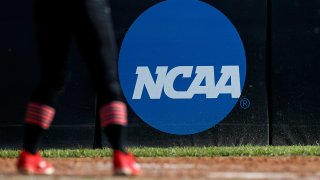
On Thursday the NCAA canceled all of its spring sporting events in light of the coronavirus pandemic. That night athletics departments at colleges and universities across the country were having conversations they wished they never had to have. They had to tell student-athletes that their seasons, and in some cases their athletic careers, were over.
"We met with all of our teams. Because the information hit so suddenly nationally there was already an awareness when we walked into the room. But there was tremendous sadness; a lot of tears. Certainly many of our students still in disbelief," said USD Athletics Director Bill McGillis, who had to help deliver the news. "The question of eligibility for those spring sport athletes was probably the first question raised in each one of those meetings."
That was a common theme on campuses across the nation. Would these student-athletes have the chance to come back and play again?
"Those kids had no idea when they stepped off the court in Vegas (at the Mountain West Conference basketball tournament) or when our women's lacrosse team last weekend, I think they beat George Mason, that those seniors potentially walked off the court for the last time wearing Aztec gear as a competitive student-athlete," said SDSU Athletics Director J.D. Wicker. "It's hard enough to do it for the last time and you know it's the last time, but it's even more difficult to find out later that, 'Oh my God, I may have played my last game.'"
With that in mind, on Friday the National Collegiate Athletic Association said it's going to try to find a way to give the student-athletes their seasons back.
It's going to grant what's called "eligibility relief." That means student-athletes from spring sports will have the opportunity to return to school under scholarship for another year of athletic competition, even if they're graduating seniors (those students would be given a chance to begin their post-graduate work). Those sports include:
Baseball
Softball
Golf (M & W)
Beach Volleyball (W)
Lacrosse (M & W)
Rowing (W)
Tennis (M & W)
Outdoor Track & Field (M & W)
Volleyball (M)
Water Polo (W)
Local
It's a massive undertaking with multiple things that still need to be worked out. There is another recruiting class coming and that usually coincides with the number of outgoing athletes, so will the NCAA loosen roster and scholarship limits? How does the school pay for the extra scholarships? Is there enough housing on campus to accommodate another several hundred student-athletes? More immediately, how do student-athletes who are recovering from injuries continue to receive care if they can't be on campus?
And that's just scratching the surface. The NCAA told NBC 7 SportsWrap in a statement that "NCAA leadership and membership committees are identifying and working through the considerable implications related to the decision to cancel remaining winter and all spring championships in response to the COVID-19 pandemic. While some decisions can be made quickly like the suspension of recruiting activity, others may take time to reach conclusion. As details become available, we will share with our membership and the public."
Some seniors who have the opportunity to return already have jobs lined up after graduation and cannot take advantage of another year in school.
"Most of these seniors are going to graduate in May at the University of San Diego," said McGillis. "So while that will benefit some students, others are graduating and moving on with their lives."
"It's gut-wrenching but it's also life. This is a harsh life lesson," said Wicker. "We've all had them. My preference would be to find some way to help make those kids whole but we'll see what it ends up being."
The NCAA hopes to have answers to most of these logistical questions some time in the next week. Another aspect of this is whether or not to update the record books with what happened before the seasons ended. In February, University of San Diego pitcher Jake Miller threw a no-hitter. Will that stand ... or is the entire season wiped out?
"That is one of those emerging questions and one of the things that is developing in some cases hourly," said McGillis.
It's another piece to a very complicated puzzle that is still very far from completion.



